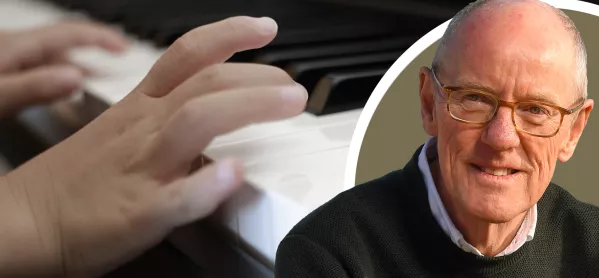Gibb told: ‘No evidence’ of music hubs underperforming

Music specialists have written to schools minister Nick Gibb to demand answers on the evidence behind planned cuts to the number of music hubs and to call for the reforms to be paused.
In a letter, the Independent Society of Musicians (ISM) has claimed that there was “no evidence” that the new hub structure would result in a better offer for schools.
There are currently 118 music hubs, however, this number is set to be reduced to 43 hub lead organisations from September 2024.
In the letter sent to Mr Gibb this week, and seen by Tes, ISM CEO Deborah Annetts said that despite it requesting the Department for Education to provide its rationale for reforming music hubs, “none has been forthcoming”.
- National plan: Subject experts cast doubt over national music education plan
- News: No regular music lessons in over third of secondaries
- 2022: Music teachers urge DfE to reform Progress 8 and EBacc
The letter also called for the restructure to be paused to “allow for proper investigation into the rationale” behind the changes.
The hubs, which are partnerships formed of schools, local authorities, arts organisations and voluntary organisations working together to create joined-up music education provision, were first introduced in 2012.
In its rationale for the changes, published in November last year, the Department for Education said that the “landscape of the schools system” has “undergone rapid changes with the creation of Teaching School Hubs and the growth of multi-academy trusts (MATs)”.
In a document, published on the Arts Council England (ACE) website, the DfE added that the “movement to working across larger geographies enables collaboration across boundaries, encourages collective decision making, empowers partners to be more ambitious and utilises resources in different ways”. ACE runs the music hubs on behalf of the DfE.
New hub structure
Ms Annetts has written to Mr Gibb again this week after an earlier exchange with the minister.
She wrote: “You responded to me on 17 October stating that the new structure for hubs must reflect the change in school structures over the past 11 years, including the increase in MATs.
“You went on to say that the new hub structure would result in a ‘greater range of delivery partners working towards a central, unified goal of excellent provision, led by a single strategic organisation’.
“However, there is no evidence to support this assertion and, despite my request for the rationale behind root and branch reform of music hubs from your department, none has been forthcoming.”
Music education plan
Ms Annetts also said that it had been suggested to the ISM by “someone who has worked closely” with the department on music education that 75 per cent of current Music Education Hubs “have been underperforming and have not made the transition to being hubs as envisaged under the National Plan for Music Education”.
She said the ISM also understood that there was a feeling that hubs are “still behaving like old-style music services and this is the reason behind the restructure”.
The DfE told Tes it did not recognise the statistic that 75 per cent of music hubs are underperforming.
A spokesperson added: “The National Plan for Music Education, published in June last year, sets out our long-term strategy to 2030 and is backed by £79 million per year for the music hubs programme to 2025 and £25 million to fund musical instruments for children and young people.
“As part of the National Plan for Music Education, the government wants hub lead organisations to build a wider range of strong partnerships with schools, academy trusts, local authorities and more. This is to ensure there are no local ‘cold spots’ where access to provision is limited.”
Register with Tes and you can read two free articles every month plus you'll have access to our range of award-winning newsletters.
Keep reading with our special offer!
You’ve reached your limit of free articles this month.
- Unlimited access to all Tes magazine content
- Save your favourite articles and gift them to your colleagues
- Exclusive subscriber-only stories
- Over 200,000 archived articles
- Unlimited access to all Tes magazine content
- Save your favourite articles and gift them to your colleagues
- Exclusive subscriber-only stories
- Over 200,000 archived articles
topics in this article



